Business Intelligence in Supply Chain: Innovative Approach to Efficiency
Updated 07 Jul 2023
15 Min
1780 Views
Logistics, as well as supply chain, are in the phase of constant progress within the rapid process of digitalization in this industry. Business Intelligence (BI) is a cutting-edge technology that found its application in this domain and provides many solutions to companies’ challenges. The global BI market value is expected to increase from $ 3.1 billion in 2020 to $33.3 billion within the three years, with a Compound Annual Growth Rate (CAGR) of 7.6% for the projected time.
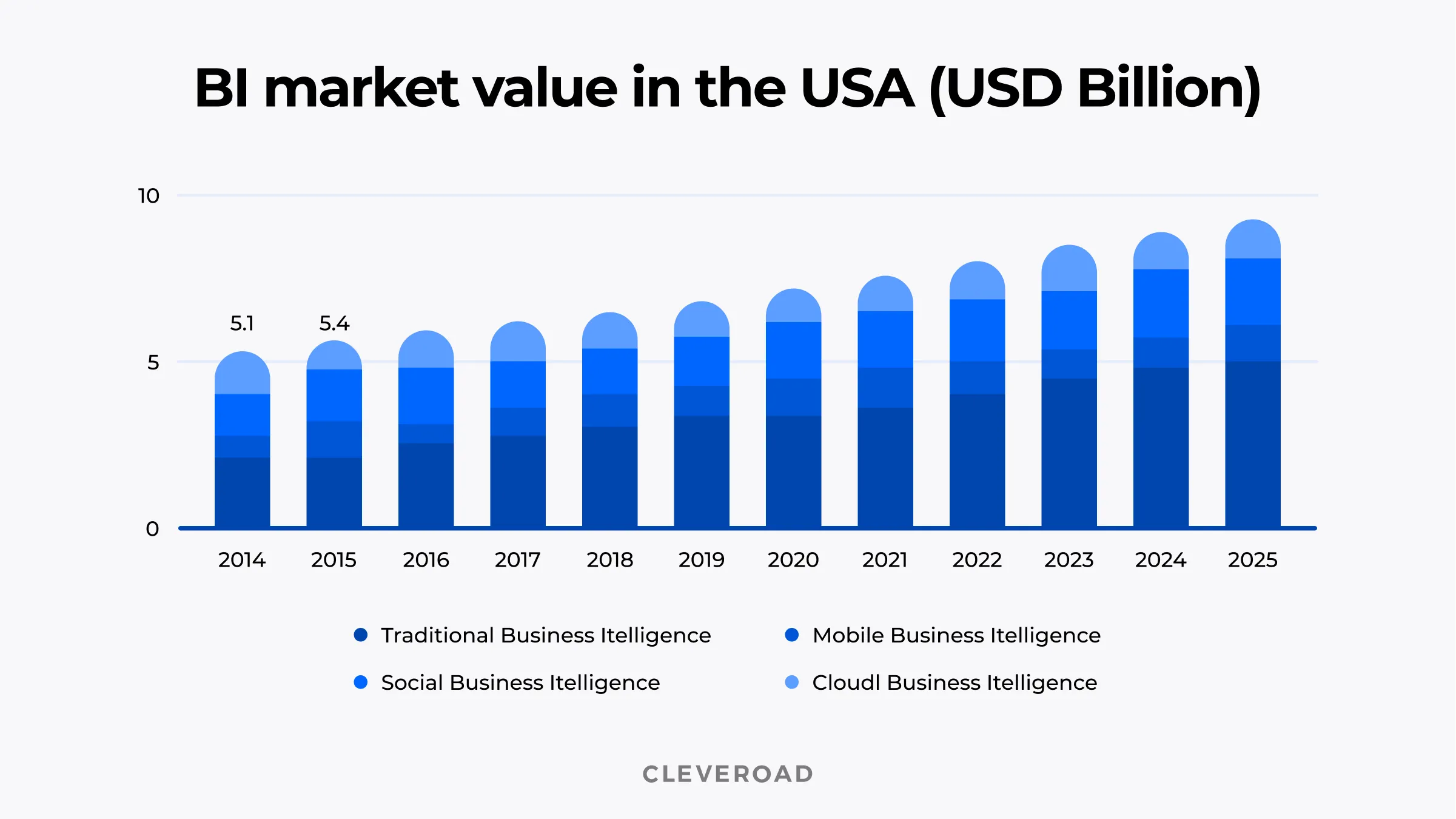
Market size of the BI technology in the USA
The implementation of BI in the logistics supply chain has advanced the opportunities of this sector and become an indispensable part of it for many entities. This technology also raises the competitiveness level, allows detecting business drawbacks, and efficiently eliminates them. Besides, companies’ owners are capable of assessing risks and making decisions according to the analysis.
The higher centering on digital turning, escalating value of analytics, the increasing need for dashboards with statistics visualization, wide cloud business intelligence adoption, and vast loads of data for processing have resulted in the high demand for BI in the logistics industry.
This article will cover how to implement the business intelligence (data warehousing) software in your supply chain business, the profit it brings, and which companies need it.
What Is Supply Chain Management in Business Intelligence
Prior to describing the business intelligence supply chain, let’s primarily observe its management process.
Supply chain management comprises a row of interconnected phases that can be classified into certain general groups.
- The planning stage involves actions like projecting the demand and assessing risks
- Acquirement refers to a row of steps like selecting vendors, defining the partnership details, and purchasing the required stock
- Production relates to the goods fabrication
- Inventory control concentrates on maintaining efficient stock equilibrium, sales, and warehousing procedures
- Logistics operation involves supplying and delivering actions
BI supply chain eases the daily process of making multiple decisions: they become planned and well-considered. Statistics and analysis increase the transparency of each step, detect tendencies and reveal patterns, to project and estimate potent results. The decision-making process is an integral process of supply chain management which greatly impacts further business development.
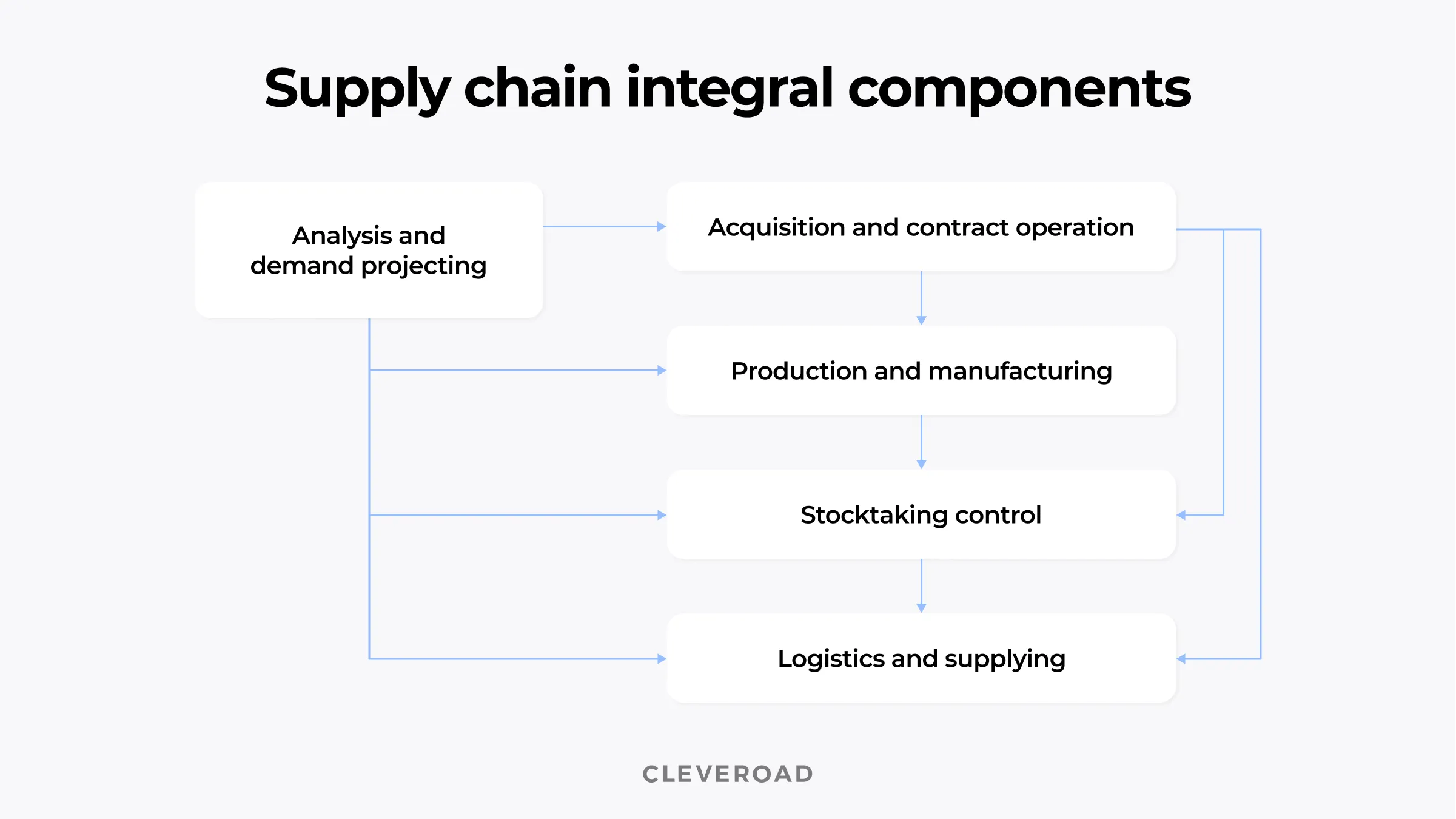
Essential elements of supply chain
What Is Business Intelligence
Business intelligence is a solution that enables the process for gathering and analyzing data as well as ensuring executives, managers, and workers with valuable reports make informed business decisions. Within the BI operations, companies gather data from internal and external resources, process it for further analysis, fulfill requests through the data, and visualize it in BI dashboards. Reports are also used to visualize data and build a more comprehensive outcome for people in business. They use these statistics for easier decision-making and strategic creation.
Prudent business decisions help entities generate more profit, advance workflow efficiency, and define which sectors of business should be improved. For this, BI solutions comprise a set of analytical tools, data processing and operation, reporting instruments, and a row of solutions to structurize and organize the assembled capacity.
Start profiting from the BI now
Cleveroad engineering team will create software meeting all your requirements and business goals
Let’s now conclude which profit and value the supply chain business intelligence brings for organizations, and how it may be used.
- BI supply chain software (with essential API in supply chain implemented) allows fitting data loads into any format to further analyze it. It may be diagrams, tables, and hyperlinks that help track the organization’s operation daily.
- To successfully assess the performance, balanced scorecards within the business intelligence solutions may be applied to combine databases. Besides, it enables building pertinent views to make the crucial data clear and comprehensible.
- Business intelligence for supply chain ensures embedded reporting and dynamic request generation features that retrieve mediatory data and conduct an assessment for all potential unfavorable effects.
- Talking about advanced supply chain management BI functionality, businesses are able to detect a ground level for diverse indicators to understand which metrics to track on a daily, weekly, monthly, and yearly basis.
- The BI technology provides dashboard customization to comply with specific business needs, which helps extract more thorough insights.
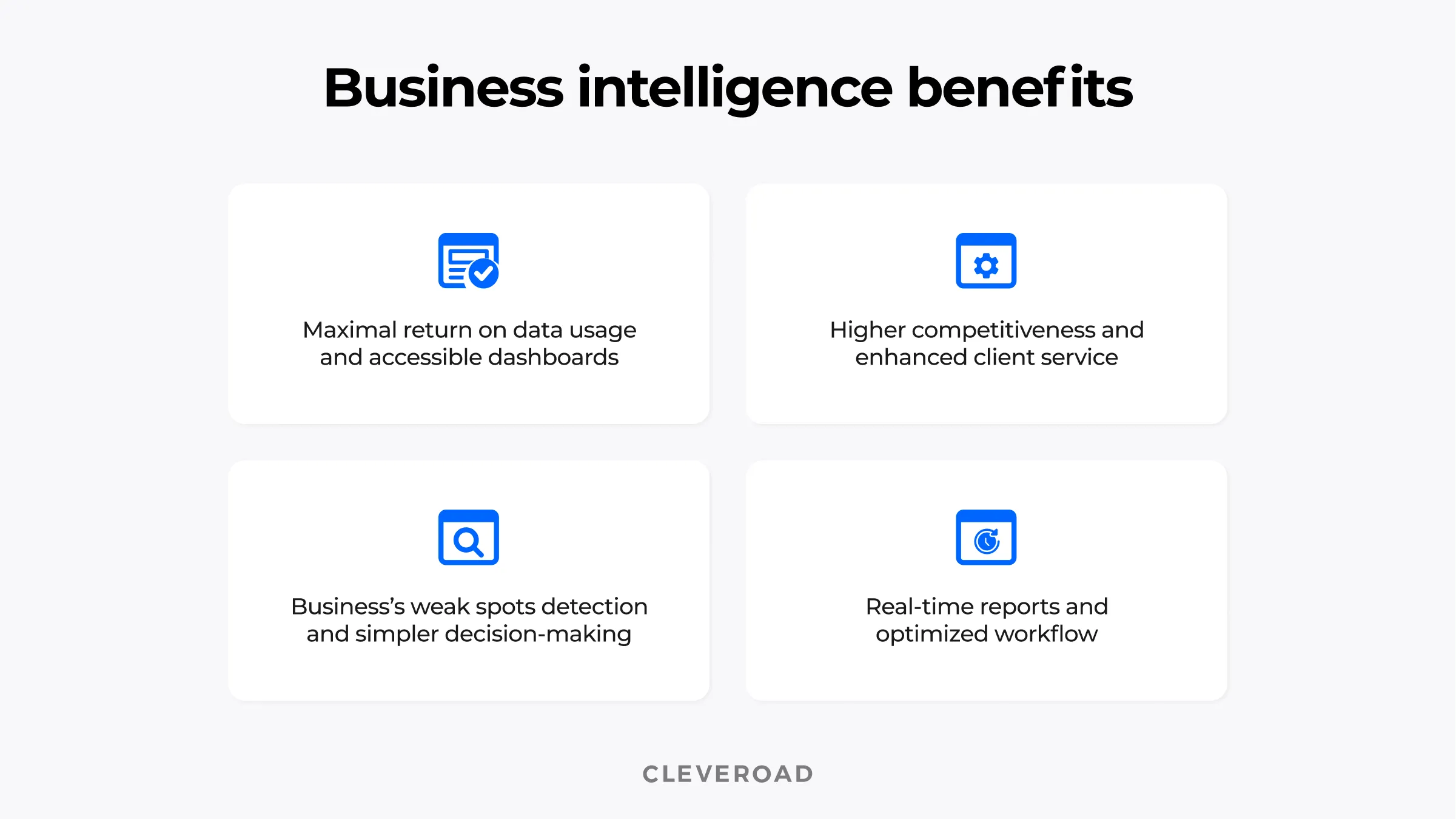
Advantages of the BI software
Will BI Be Profitable for Your Business?
Here are some practical cases of business intelligence in supply chain usefulness and solutions this technology provides to this niche:
- BI enables key decision-makers to track business flaws and ensures the metric-driven reports to build proper strategy aiming at the inefficiency elimination. In case you would like to raise the company productivity, supply chain analytics is a way to meet this goal.
- Features like scorecards and dashboards brought by BI ensure in-depth breakdowns of statistics on the entity's key performance indicators with a great diversity of accessible metrics. This functionality allows monitoring the business advancement for various time periods. Besides, organizations' owners receive precise predictions according to the earlier analysis outcomes.
- As the supply chain management incorporates a wide range of departments, it will overcome insufficient reviewing and data spreading through the business departments. BI collects all of your company’s data into a single platform. Thus, if the company's departments lack transparency of workflows, business intelligence solutions for supply management are key to tracking and analyzing their operation.
- Having comprehensive and specific data concerning each manufacturing stage on hands, business intelligence in supply chain management enables observing the entire process from obtaining raw materials for production to supplying the ready goods to clients and substantially elaborating the principles as well as procedures of each stage.
Want to find out more about business intelligence implementation? Check our article to find out more about this technology
In case all the implementation steps were done correctly, business intelligence for supply chain management will raise the efficiency by delivering a comprehensive report of all services, departments, as well as each supply chain stage. Entities’ owners can track supplier performance against the service level agreements to define new advancement ways and strategies, conduct more fruitful discussions, and build rate contracts according to the outcomes.
Business intelligence software provides the supply chain manager primarily with in-depth reporting. Detalization to analyze shipments, itineraries, ferrymen, bookings, slotting, wait times, cargo reassessment, and payment to understand cost variables. You can optimize accordance reporting with detailed data on documentation.
With BI, you are also able to build visualization within diagrams, graphics, and charts. These models may be both dynamic or static and accessible online to make them available for the teammates.
How BI Overcomes Challenges in Supply Chain
The interconnected components comprise the supply chain, like workflow management, logistics operations, acquisition, and a great diversity of others. This complex multi-step system operates together like a machine, and in case of one element’s "breakdown," the entire chain can't be completed successfully.
Business intelligence for supply chain management streamlines allows controlling and guiding every stage of the system to help in the business expanse. Thus, the successful BI implementation and operation can provide significant solutions to the wide range of logistics obstacles.
Yard and Demand Management
Every expanding business is aware of the pains and needs of clients and operates the stock within the dynamic audience requirements and market changes. Obscure projection of demands and low stocktaking control results in decreased revenue margins and raised supply chain expenses. Lots of enterprises strive to meet constantly changing market requirements parallelly growing the income.
Business intelligence is an irreplaceable tool in these terms. BI ensures market prognosis and analysis to maximize the productivity of your supply chain, deliver greater client service, enhance inventory operation as well as control, and streamline trade processes.
Real-Time Tracking
The supplying notion is not only about transporting goods. This process comprises due packaging, product yard processes, warehousing, and logistics operations. Constant observation of the shipping progress and informing the delivery statuses to the appropriate parties in real-time can be quite fatiguing. Yet, timely and proper informing is a determining factor for the business productivity level as well as its endurance.
With business intelligence supply chain management is simpler, as organizations can overview the online delivery status to enhance client service by notifying the changes. With BI the process of tracking outgoings like fuel expenses, defining supplier obstacles, and defining more advancement strategies is simplified. Thus, the enhanced workflow will considerably raise the revenue with less effort required.
Systems Conjunction
Talking about what is supply chain management in business intelligence, we may state that this software comprises all systems in a single multifunctional solution providing a broad spectrum of control, operational, and analyzing capabilities. Chosen KPIs can be visualized with BI to comprehend the insights simpler. Such technology also allows delivering goods on the market more rapidly, detecting the parts which can be enhanced, cutting down the time spent on the logistics processes, and increasing entity effectiveness.
Projecting Opportunities
Business intelligence and supply management in conjunction can provide not only higher control level but a forecast of dynamic market requirements as well as future trends patterns according to the data analysis. The faster the company is aware of the further demands, the simpler it is to keep up with them and become more competitive. Companies that adapt to the present situation on the market essentially expand the client base, delivering higher satisfaction and obtaining higher profit in turn.
Internet of Things Integration
Smart machinery is another excellent solution that is widely applied in the supply chain digital transformation to streamline and simplify lots of logistics processes. Internet of things ideas which are interrelated with each other, generate vast data loads. BI software ensures the opportunity to extract the drill-down data concerning each logistics step and benefit from it.
IoT devices assemble and access real-time data, which results in stable and productive performance. In practice, the smart equipment is able to notify employees when it requires maintenance services or renovation. Such a smart solution raises the rentability and efficiency of the workflow.
Want to observe booming IoT ideas for business? Read our recent article on this topic
How to Implement Business Intelligence in the Supply Chain
After considering all the capabilities you may receive with BI, let’s now observe the implementation process more precisely.
Informing Personnel and Stakeholders
Apart from notifying the team as well as all the significant parties of the new technology you would like to implement, you should complete guidance on how to use it. Training the teammates should be taken seriously, as each employee should know the functionality opportunities. Otherwise, your personnel will try to find ways to avoid using the BI.
While educating the team, you should emphasize the profit the software will bring and which processes it can simplify to engage the workers into using it. In addition, you should prepare a plan consisting of a row of steps leading the organization to achieve the set goals.
Outline the Aims
The next step is coming up with what targets your company needs to obtain within the business intelligence implementation.
With a prepared set of goals to accomplish, it will be easier to understand how to properly implement the BI software into the supply chain and your fundamental workflow by restructuring it to comply with the solution’s capabilities.
Define the Key Performance Indicators
Having the targets to reach on hand, you should set key performance indicators (KPIs) properly in accordance with those aims to track the accomplishment progress. The chosen metrics should be measurable, and they should be selected individually for each case. Besides, clear KPIs (e.g., inventory turnover, stock-to-sales ratio, or order precision) will help you to make proper business decisions on each supply chain stage.
Form a Team
The following phase includes choosing a software development team that will build and deliver the BI solution for you. The main hiring options you can select are the following:
Freelancers
The cost-efficiency of this option makes many people in business go for choosing freelancers. Nonetheless, there’s a row of drawbacks you should be aware of. To illustrate, you’ll have to verify their competence yourself, deal with cultural and time zone differences, etc. Besides, some unscrupulous employees may request a prepayment and simply disappear or deliver a low-quality product.
In-house teams
This variant implies employing specialists and gathering specialists in one office. The list of expenses you'll need to cover is not small, so you should keep in mind that this option is the most costly one. Some of them are premise rent, necessary hardware purchasing, regular salaries paying regardless of the number of assignments, etc. Thus, in-house teams are great for great corporations.
Outsourcing companies
The golden mean of excellent performance and adequate costs is outsourcing the project. With this option, all the project completion-related responsibilities hand over to the team of certified, already employed professionals who will rapidly deliver your software meeting all your requirements. With outsurcing, you invest only for the work done with no need for extra outgoings. At the same time, the product quality is flawless due to the high competence of the hired team.
What’s more about outsourcing, the most popular IT hub for choosing the development partners is Central Europe. This region is highly popular due to the following reasons:
- Reasonable rates
- An immense pool of professionals
- Excellent IT education
- High proximity
- Great English skills
Start a flawless BI project now
Book a call with our Solution Architect and receive a roadmap on the implementation steps
Build the Execution Strategy
Once you have a software development partner, resources, and a delivered BI system, it's time to map out the execution strategy to integrate the software into your supply chain processes.
There are two well-known strategic methodologies to choose from:
- Top-down approach. This method is a more strategic one. With it, you primarily define aims and negotiate how to accomplish them with your personnel. The focus is set more on the indicators rather than on the ways of progress.
- Bottom-up approach. This option relates more to sticking to a certain tactic. You should begin with detecting the flaws to come up with the optimal solution within the organization.
Identify Assignments & Delegate the Resources
The next step is describing the tasks your team should perform and properly allocating human resources for them.
And consequently, after that, you should entrust the scope of work to each employee and provide the resources as well as essential facilities to accomplish the assignments.
Find out more about who is BI developer and what crucial skills this specialist should possess to build excellent software
Perform the Data Cleansing, Processing, Analysis Process
Possessing all the key instruments, you should complete a data cleansing process.
Enormous data loads gathered should be drilled down to provide more precise and detailed information helping to reach business goals, so the inefficient and useless data should be cleared, and the base should comprise only clean and beneficial resources.
Another aspect to take care of is the checkpoints to assess the data quality within the established frequency. With efficient data cleansing, the entity possesses all the necessary information to achieve the goals and increase revenue.
The following step is data processing, which refers to developing specific guidance to enhance the responses quality and request determination period.
After that, you should integrate the BI analytical instruments to extract the insights.
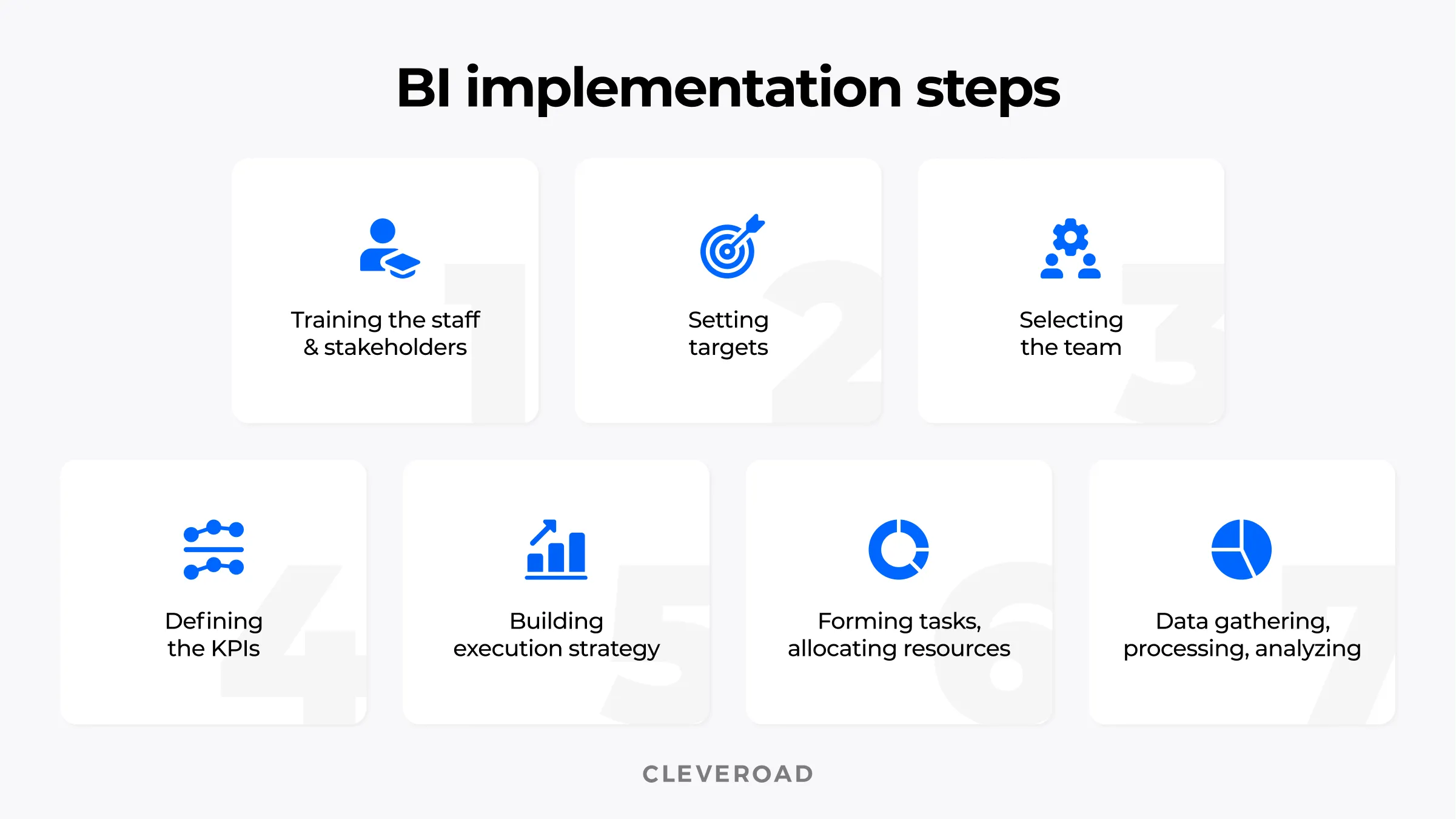
Business intelligence implementation process
Best Practices in BI Supply Chain Management
Supply chain BI is quite a complex solution, and you should be aware of certain peculiarities to make this software useful and efficient for your company. Therefore, we would like to provide some tips on business intelligence implementation to maximize production efficiency:
- Possessing the right governing council and appointing frequent meetings to negotiate targets and strategies averts businesses from digressing from the outlined objectives.
- Application of the BI software allows you to monitor client behavior patterns as well as requirements, forecast market trends, detect the lags and assess the risks to obviate them.
- More rapid and productive workflow delivers enhanced client service which will engage a broader audience to your business.
- Negotiation, as well as the agreement with integral suppliers, brings a more realization and conception of both sides' targets and relationship balance maintenance between the parties. In addition, it will result in decreasing the time and expenses of purchases processing as well as enhanced and faster feedback.
- The stock optimization possible with BI provides an improved goods flow and cuts down the storing-related investments in the products yard.
- Frequent reconsideration of workflow based on BI analytics within specific periods allows building a more successful strategy and boosts productivity to generate more profit.
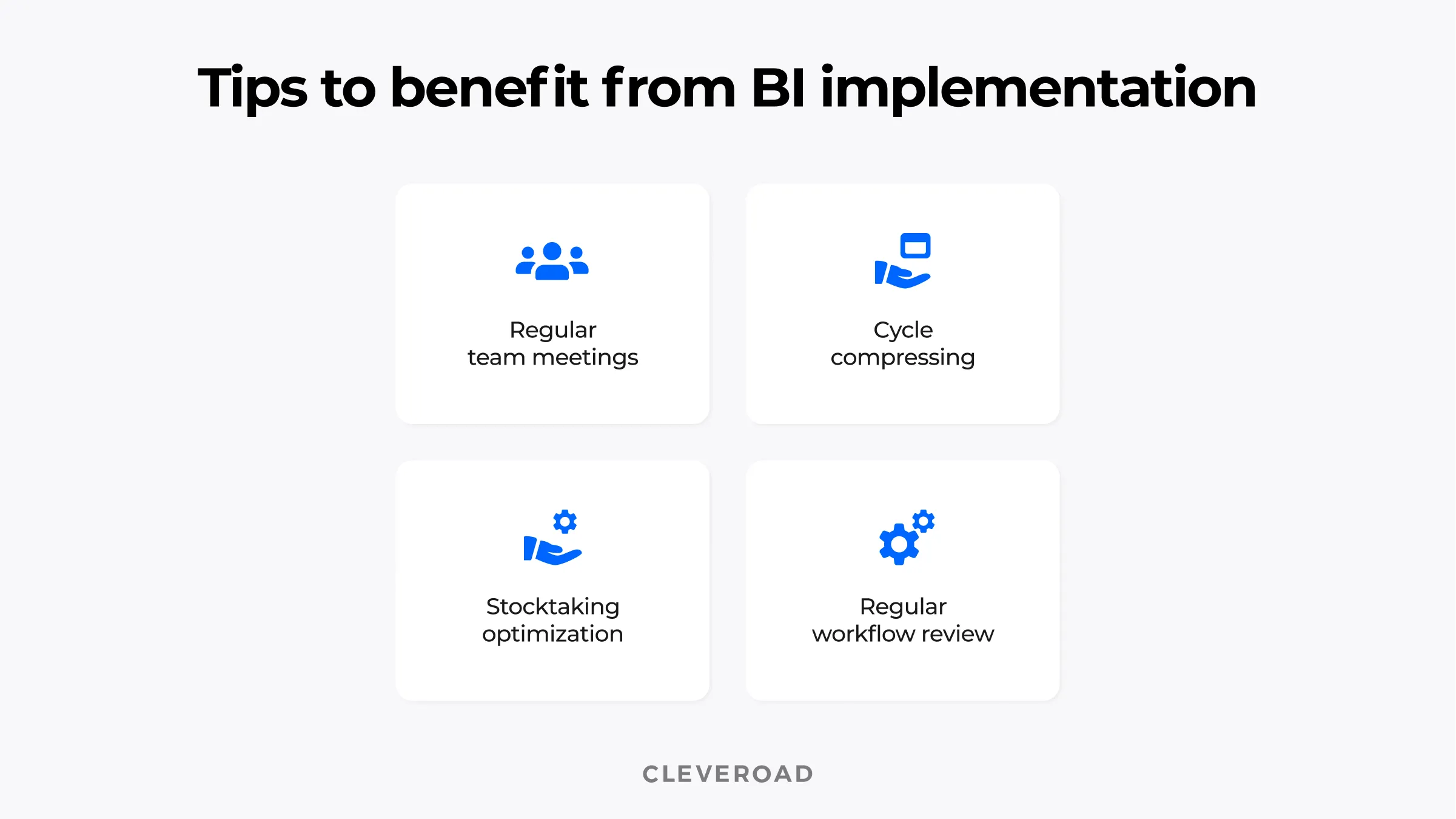
How to profit from BI
Digitalization in logistics using business intelligence in supply chain management always requires a customized, individual approach. Thus, it’s significant to pay attention to the choice of partner, as the competence of the software development vendor determines the quality of the final product.
Cleveroad Expertise
Cleveroad is a professional software development company with a solid 10+ years of experience in delivering a great diversity of IT-related services and custom-developed software solutions. Our digital products provide clients with competitive advantages, increase workflow efficiency as well as revenue, and solve many business challenges.
Over 170+ successful projects have advanced the businesses of our partners. Our valuable benefits also comprise:
- A team of certified experts who rapidly responds to new requirements and changes in the project by integrating them into current workflows
- Experienced QA engineers working on your project and test the product on every development phase
- An in-depth consultation to assemble input requirements and create a roadmap for further project completion
- Proven comprehensive experience in software development across numerous domains
- A cutting-edge tech stack and innovative development approach to create even more sophisticated software
We develop solutions for logistics to decrease operational outgoings, optimize supply chains and workflows of warehousing, transportation, cargo delivery, etc. You can verify our in-depth competence in the creation of such software with our portfolio or rates and reviews on sources like Clutch and GoodFirms.
Start BI creation for your business
Our Business Intelligence experts will complete a consultation on your project fulfillment
- BI supply chain software allows fitting data loads into any format to further analyze it. It may be diagrams, tables, and hyperlinks that help track the organization’s operation daily.
- To successfully assess the performance, balanced scorecards within the business intelligence solutions may be applied to combine databases. Besides, it enables building pertinent views to make the crucial data clear and comprehensible.
- Business intelligence for supply chain ensures embedded reporting and dynamic request generation features that retrieve mediatory data and conduct an assessment for all potential unfavorable effects.
- Talking about advanced supply chain management bi functionality, businesses are able to detect a ground level for diverse indicators to understand which metrics to track on a daily, weekly, monthly, and yearly basis.
- The BI technology provides dashboard customization to comply with specific business needs, which helps extract more thorough insights.
BI supply chain eases the process of making multiple planned and well-considered decisions daily. Statistics and analysis increase the transparency of each step, detect tendencies and reveal patterns, to project and estimate potent results. Decision-making is an indispensable process of supply chain management that greatly impacts further business development.
Business intelligence software provides the supply chain manager primarily with in-depth reporting. Detalization to analyze shipments, itineraries, ferrymen, bookings, slotting, wait times, cargo reassessment, and payment to understand cost variables. You can optimize accordance reporting with detailed data on documentation. BI also is able to build visualization within diagrams, graphics, and charts. These models may be both dynamic or static and accessible online to make them available for the teammates.
Business intelligence (BI) is a solution that enables the process for gathering and analyzing data as well as ensuring executives, managers, and workers with valuable reports make informed business decisions. Within the BI operations, companies gather data from internal and external resources, process it for further analysis, fulfill requests through the data, and visualize it in BI dashboards, as well as reports to build a more comprehensive outcome for people in business. They use these statistics for easier decision-making and strategic creation.
In case all the implementation steps were done correctly, business intelligence for supply chain management will raise the efficiency by delivering a comprehensive report of all services, departments, as well as each supply chain stage. Entities’ owners can track supplier performance against the service level agreements to define new advancement ways and strategies, conduct more fruitful discussions, and build rate contracts according to the outcomes.
- Inventory management
- Shipment tracking and notifying
- KPIs assessment and monitoring
- Market conditions forecasting
- IoT machinery integration

Evgeniy Altynpara is a CTO and member of the Forbes Councils’ community of tech professionals. He is an expert in software development and technological entrepreneurship and has 10+years of experience in digital transformation consulting in Healthcare, FinTech, Supply Chain and Logistics
Give us your impressions about this article
Give us your impressions about this article